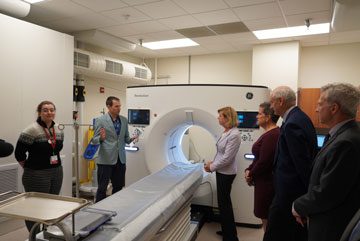
UW-Madison hospital staff discuss merits of imaging devices with Sen. Tammy Baldwin, Sec. Missy Hughes and others.
Message from WEDC Secretary and CEO Missy Hughes
In October, President Joe Biden and the U.S. Economic Development Agency (EDA) designated Wisconsin as a Regional Technology Hub in the field of personalized medicine and biohealth technology.
Less than a month later, Wisconsin has already seen the first benefits.
On Nov. 10, Microsoft announced its plans to invest billions to expand its data center footprint in Mount Pleasant. The Regional Technology Hub designation was one of many reasons the company cited for choosing to expand in Wisconsin.
While Wisconsinites know all about our state’s long history of innovation and discovery and our unmatched workforce, the federal designation is putting the state on the radar of tech companies and entrepreneurs worldwide.
The designation came about through the hard work of the Wisconsin Biohealth Tech Consortium, a group that includes WEDC as well as our university, economic development, and industry partners.
The designation also came with a $350,000 EDA strategic development grant that is allowing WEDC and its partners in the consortium to move forward with plans that will increase collaboration, speed up discovery, and increase prosperity across the state.
Plans for the hub include creating shared data and systems to accelerate innovation, improving access to capital, working with manufacturers to enhance the supply chain, and creating career opportunities and supports so that everyone can share in the benefits.
Meanwhile WEDC is moving forward with its commitment to support the hub and the companies working toward the next big innovations in biohealth. For the first time, WEDC is offering organizations that work with biotech and personalized medicine companies a chance to receive an Entrepreneurship Partner Grant (EPG). EPGs are designed to fund organizations that offer entrepreneurs and startups services such as training, technical assistance, mentors, and seed accelerators.
WEDC has pledged $500,000 to be awarded to organizations specifically working with the biotech industry. Grants, which will likely range from $10,000 to $200,000, will be awarded to programs based on factors such as the number of entrepreneurs served, cost effectiveness, and innovation. Visit the Entrepreneurship Partner Grant Program page for more information.
Earning the Regional Technology Hub designation means that the state is now competing for up to $75 million in funding under the federal CHIPS and Science Act of 2022. That funding, combined with the Regional Technology Hub designation, could supercharge biohealth and personalized medicine research and development in our state. And the industry could serve as a key to Wisconsin’s “good jobs” economy, where employers hire and retain a skilled workforce in jobs with benefits and upward mobility.
However, the benefits for our communities, our economy, and our state extend far beyond the financial. We must realize, as we talk about the economic benefits of biotech and personalized medicine, the tremendous good that can be done for humanity. The developments these entrepreneurs and companies are pursuing are cures and treatments that can save lives and enhance quality of life for all of us.
The Regional Technology Hub designation means Wisconsin is expected to improve medical care for patients—including those who may have been left out by past innovations. Plans call for establishing a Patient Advisory Group to give feedback to researchers and the industry. We will ensure that real patient needs are steering the hub’s direction.
While most of the consortium’s work will be focused on personalized medicine—which includes genomic innovation, advanced imaging, big data analytics, artificial intelligence, and more—the federal hub designation and the work of the consortium position Wisconsin (with its skilled workforce, advanced manufacturing capabilities and renowned university system) as a place where innovative technology companies of all types will want to be.
And that brings us back to Microsoft and its announcement that the company will be investing billions of dollars into expanding its data center footprint in Mount Pleasant.
This is not Microsoft’s first investment in Wisconsin. The company is a valuable partner in TitletownTech, a venture capital firm in Green Bay formed out of a partnership between Microsoft and the Green Bay Packers. That partnership has resulted in startup attraction and development as well as investments in computer science education.
In Microsoft’s announcement of its plans in Mount Pleasant, the company cited Wisconsin as a place where Microsoft intends to invest to develop a focal point for cloud computing.
Microsoft’s announcement is just the first of what I hope will be many investments in Wisconsin and in our future personal and economic health.
